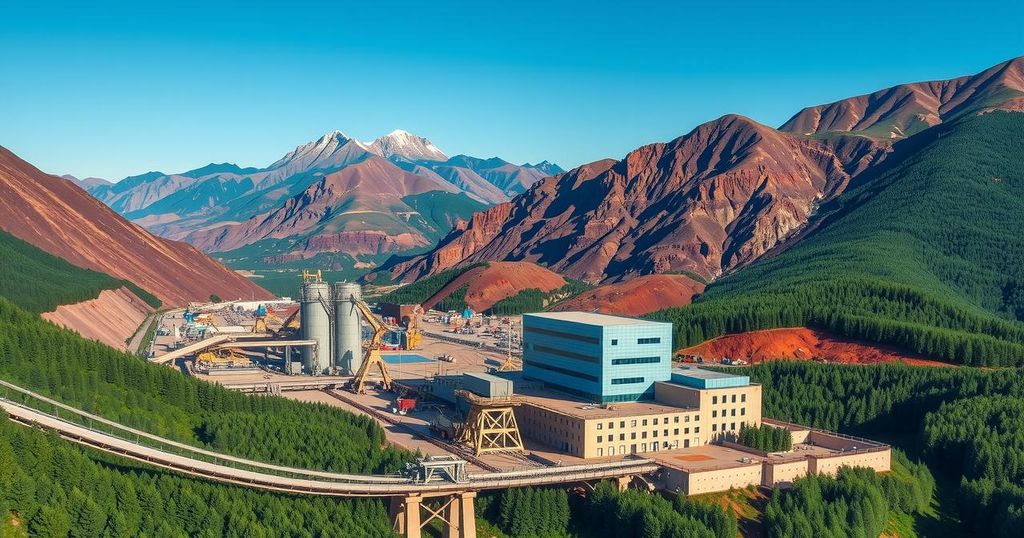Prospective US-Congolese Mining Partnership: Strategic Implications and Concerns

The DRC is in discussions with the Trump administration to secure a mining deal aimed at combating the M23 rebels and reducing Rwandan influence. This agreement could provide US access to critical minerals, while the Congolese administration hopes to gain security support. Concerns arise about the transparency and economic ramifications of such negotiations amid the ongoing regional conflict and dominant Chinese investments.
The Democratic Republic of the Congo (DRC) is optimistic about finalizing a mining agreement with the Trump administration to leverage US support against the M23 rebels and Rwandan forces in eastern DRC. Initial discussions regarding access to DRC’s abundant mineral resources, crucial for advanced technologies, have been confirmed by the Congolese presidency and the US State Department. The potential deal is aimed at enhancing security and stability within the region.
Congolese President Felix Tshisekedi first articulated the possibility of a minerals deal during a February interview with The New York Times. He proposed a stake in DRC’s mineral wealth to the United States and Europe, emphasizing the urgency of seeking international pressure on Rwanda, which is accused of aiding the M23, a rebel group involved in a significant offensive in the region. The Congolese administration is signaling its desire for stronger partnerships to enhance its geopolitical standing.
In a move to formalize the partnership, a Congolese senator sent a letter to Secretary of State Marco Rubio proposing a collaborative framework. This letter included provisions for US access to mineral resources, operational control of a strategic port facility, and the establishment of a joint mineral stockpile. In return, the United States would provide military training to Congolese forces to secure mineral supply routes against insurgent attacks.
Expert opinions on this potential agreement are mixed. Jason K. Sterns noted skepticism regarding the feasibility of US military involvement, citing the complexities of US foreign policy commitments. Moreover, he acknowledged the Congolese army’s vulnerabilities and the reliance on international pressure to manage the conflict, particularly relating to Rwandan influence in the region.
Calls for transparency surrounding negotiations have been voiced by local experts. Jean Pierre Okenda expressed concern that the urgency of securing a deal may not align with the best interests of the Congolese populace. He emphasized that any agreement should involve parliamentary oversight to ensure it supports national economic interests rather than merely consolidating political power.
Congolese spokespersons are positioning the negotiations as a means to diversify partnerships rather than a straightforward trade of minerals for security assistance. They reiterated their stance that foreign companies should purchase directly from DRC rather than via Rwanda, thus asserting sovereignty over their resources.
The dynamics involving US sanctions against Rwandan officials underscore a shift in Western attitudes towards Rwanda’s involvement in the conflict. This is exemplified by the recent US Treasury sanctions targeting key figures accused of collaborating with the M23 rebel group, marking a significant development in US-Rwanda relations.
The ongoing effort to secure Western investment in DRC’s mining sector signifies a strategic pivot away from reliance on China, which currently dominates the market. Analysts highlight that while Tshisekedi seeks to engage more with the West, the challenges of transitioning from a predominantly Chinese relationship remain complex, including renegotiated agreements that have yet to yield substantial benefits for local communities.
Engagement with the United States presents some operational complications due to the existing landscape of mining concessions primarily held by private companies. The DRC’s willingness to negotiate with the US signals a quest for alternative investment and support, even as historical challenges from prior American operations linger in public memory.
Amid discussions, Congolese officials affirm progress and continue communications with the US regarding a potential partnership. Reports suggest that Trump may appoint a special envoy focused on enhancing mineral trade negotiations. While optimism persists, the feasibility and implications of such a partnership remain to be fully realized.
The potential US-DRC mining agreement represents a strategic attempt to leverage mineral wealth in the face of security challenges posed by regional conflicts. While both countries engage in preliminary discussions, there are calls for transparency and caution regarding the implications for Congolese governance and the local economy. Observers note the necessity of ensuring that any agreement benefits the DRC populace and respects local sovereignty, especially as the nation seeks to navigate its dependency on foreign investments, particularly from the West over China.
Original Source: www.france24.com








